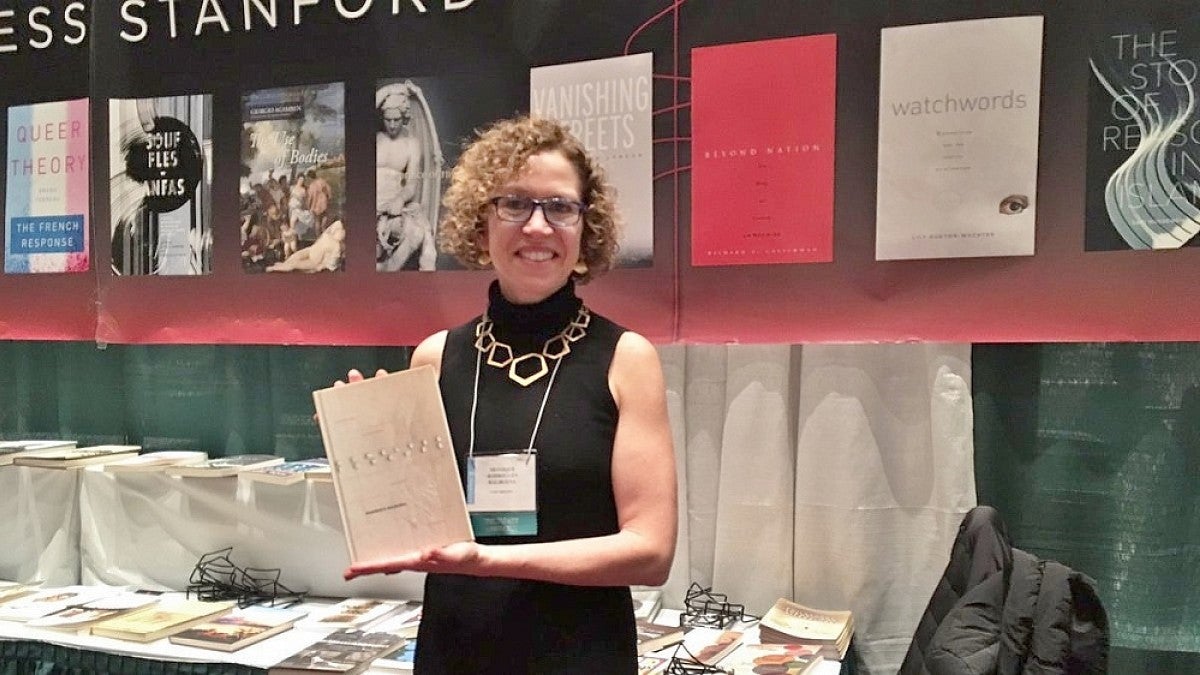University of Oregon Clark Honors College professor Monique Balbuena was recognized by the Jewish Book Council for her most recent work, “ Homeless Tongues: Poetry and Languages of the Sephardic Diaspora”.
Balbuena’s book was a finalist in the category of Sephardic culture for the National Jewish Book Awards, the longest-running and most prestigious Jewish literature awards. “Sephardic” refers to Jews whose ancestors originated in the Iberian Peninsula, which includes Portugal and Spain.
“Homeless Tongues” examines three different Jewish authors who write in threatened and minor languages by analyzing their texts and observing the way they construct their identities through choices of languages and texts. Balbuena reclaims authors who have gone unrecognized within their fields. Sometimes Jewish writers go unnoticed because they are not recognized as Jewish; in the U.S., Jewish people are often assumed to be from Eastern European Jewish communities.
“They are the current majority, so it makes sense by the numbers alone, and they have been the focus of much scholarship and popular recognition of what is Jewish,” Balbuena said. “So if I say Seinfeld, you might identify him as Jewish, but if I say Dara Torres, you might not because you might not recognize Torres as a Jewish name.”
This tendency to generalize and oversimplify the Jewish community is also present in the academic world. Many Jewish authors are not recognized for their efforts because they are not seen as “truly Jewish” while simultaneously being discriminated against because they are Jewish.
One of these unrecognized authors is Sadia Lévy, an Algerian poet who primarily writes in French, but a French that draws from Hebrew, Ladino (Judeo-Spanish), Arabic and other languages.
“I actually have an intense argument with the field of Francophone studies for not recognizing him, mostly because he is Jewish, and a Jew in Algeria at that time was considered French,” Balbuena said.
This dichotomy leaves Lévy caught in the middle, unknown to traditional Jewish literary historiography and excluded both from French and Francophone literatures. “I'm trying to carve out his rightful place,” Balbuena said.
Another author Balbuena studies is contemporary Israeli poet Margalit Matitiahu, who writes bilingually in Hebrew and Ladino. Matitiahu’s family is from Salonika — now Thessaloniki, a city in northern Greece.
“Salonika had one of the largest Jewish communities and one of the most important Sephardic communities,” said Balbuena. “Ninety-five percent of its population was killed by the Nazis. When you have 95 percent who are murdered ... you are murdering an entire community ... and you are killing a whole world that goes with it.”
Through her work, Balbuena hopes to increase public awareness of the vast cultural, linguistic and intra-ethnic diversity within the Jewish community.
“When we talk about Jewish literature (we need) to really incorporate those other voices and to honor the intradiversity and the multivocality of Jewish writing,” she said. “There are many languages, there are many accents, there are many differences, and my point, which I try to make in my book, is to reaffirm them, to honor them, and to protect them — to make them known.”
Part of this process is to bring the authors into a visible space within Jewish literature and to broaden the canon, or repertoire, which is a goal of “Homeless Tongues.”
Balbuena also discusses the political implications that languages can have when she writes about Argentine poet Juan Gelman, who chose to write in Ladino even though it was not his native or even his ethnic language, since he is not Sephardic.
“He rejects the national language of Argentina in favor of a diasporic language, a language that was created with no state, no borders, no military, no power, no oppressive government,” Balbuena said. “It’s a direct rejection of the oppressive military dictatorship that was in power in Argentina.”
Gelman’s use of Ladino as a political statement is unusual, but Balbuena includes it in her work because it is a fascinating use of the language in a contemporary setting and because it destabilizes notions of a fixed identity.
Ladino is generally considered a dead language because there are no communities today actively speaking it. Balbuena acknowledges the loss of the language within daily use but argues for its increasing symbolic and affective value.
“It has no community, it has no organic maintenance,” she said. “But there are many other initiatives that make it, if not a language of daily use, a language of intense ... symbolic value that still prompts people to use it, more and more, for art.”
Balbuena is one of a handful of international scholars looking at Ladino texts not only as historical documents or philological sources but also as literature, and she is actively engaging with them from the perspective of literary critique and critisim.
“My field doesn’t really exist, so in a way I am shaping the field,” Balbuena said.
In the past few years the field of Sephardic studies has grown, something that can be seen in the large number of titles considered for the Sephardic culture award during this year’s National Jewish Book Awards.
“I feel now that I’m less alone, there are more people writing about Sephardic literature and ... we don’t have to justify every little thing we do,” Balbuena said. “Sometimes I feel as though we are having a little Sephardic revolution, and it feels good.”
Balbuena is currently working on two more books, one focusing on the revival of Ladino through poetry and songwriting and the other about Sephardic literary responses to the Holocaust.
—By Isabella Garcia, Clark Honors College multimedia communications assistant


